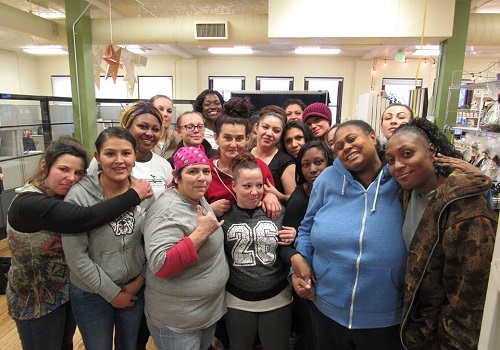This piece was originally published as part of REDF’s The Business of Social Enterprise an ongoing series profiling social entrepreneurs who are applying their business skills learned through many years of experience in the for-profit sector toward transforming lives through employment-focused social enterprise.
First up: Tamra Ryan, CEO of the Women’s Bean Project which helps women who face significant barriers learn the skills required for gainful employment and self-sufficiency. [Editor’s note: SEE Change is delighted to have recently interviewed Tamra for our new podcast and will be publishing that interview soon right here and on iTunes- so stay tuned!]
What brought you to Women’s Bean Project and what do you want to accomplish here?
My background prior to coming to Women’s Bean Project was in marketing and business development. I worked in a lot of different types of businesses, but always in the private sector, from for-profit education to an internet company, in roles oriented toward marketing, product development, and sales.
As CEO of the Bean Project, my job is to set a vision. I like to say, “Hey everybody, let’s go over there!” while painting a picture of what the future could look like if we achieve our wildest dreams. I feel successful when I see that we have buy-in on that vision and that we are all marching in the same direction toward common goals.
What we do
Women’s Bean Project offers a transitional job in gourmet food manufacturing and handmade jewelry assembly to provide women immediate income, arrange support services to overcome barriers to employment, and teach the job readiness skills needed to get and keep a job. Our products include gourmet bean soups, chili, cookie & brownie mixes, bread mixes, organic Fair Trade coffees, and sweets.
We’re in all of the Kroger stores in the state of Colorado, and 125 Safeway and Albertsons stores. We’re in some Walmart stores and we sell our products on Walmart.com and SamsClub.com. These companies carry our products because they can see that there is a relationship between selling the product and helping improve the community and changing people’s lives.
The business of beans
One of the most significant concepts that I brought to this organization, coming from my background in private-sector business, is the idea that we create more jobs when we sell more product. Initially, the Bean Project was much more oriented around helping the women meet their basic needs and providing skill-building program activities, and much less oriented toward building a strong business. Eventually, a balance between the business and the mission had to be found.
On some level, we could probably make any product, as long as it there was a market for it. We’re not in business to make bean soup, and yet we can’t exist without it. Conversely, if we’re not serving the mission, then the product doesn’t matter. And if we’re making great product, and the mission’s not being advanced, then we are falling short. The key is that the two have to be intertwined and interdependent.
So, the better our business does, the better our mission is served. In the past we haven’t had the capacity to serve every woman who needed us. Historically we’ve turned away 80% of qualified applicants. That is not okay with us. I’ve drawn a line in the sand. We will hire every woman who needs us. The next step is to figure out what our business must look like to accomplish this. And once we’ve hired her, we need to make sure that our services are so effective and far-reaching she is the last in her family to need us.
Marketing smarts: Storytelling 101
A social enterprise is a marketer’s dream come true. As human beings, we love hearing people’s stories. That’s great for Women’s Bean Project because we have powerful stories from the women whose lives are transformed. In our products we have the tangible evidence of the work that’s done, plus we have a variety of ways to tell our story with the products.
Every product says Lovingly Handmade by… and is signed by a woman in our program. And each product says, “When you buy this product, you’re helping a woman move toward personal and economic self-sufficiency.” That’s good for the Bean Project because it tells our story, and it’s also good for our retail partners because it is such a great story to have in their store. Companies can sell our products and get the halo effect of selling a product from a social enterprise.
Social Enterprise success metrics
Success for our organization is measured by sales growth. The better the business does, the more the mission can be served. Growth is critical so we can avoid turning women away. We also look at how many women graduating the program. We monitor job placement and job retention after graduation. Our three year average for these metrics is 98 and 93 percent, respectively.
For our program participants, the biggest measure of success is: has she fundamentally changed her view of herself? One of the greatest outcomes for a graduate of Women’s Bean Project is when a woman leaves believing she’s worthy of a better life. I don’t know how you measure that, but you know it when you see it.

